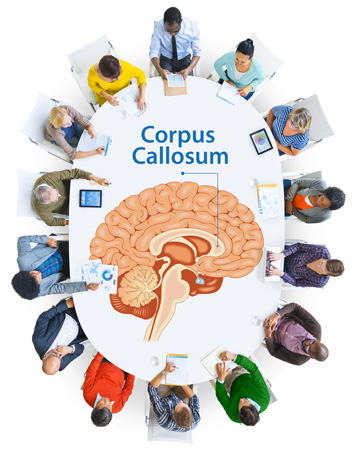The following list provides information regarding on-going research studies related to disorders of the corpus callosum. The National Organization for Disorders of the Corpus Callosum (NODCC) does not directly sponsor or endorse specific scientific research programs, but in general does encourage research because it allows for advances to be made in the study of disorders of the corpus callosum. If you are interested in participating in or learning more about these projects, please contact the project coordinators.
If you have general questions about these proposals, you are welcome to contact Dr. Paul Guilbault, Chair of the NODCC Scientific Advisory Board, at rpg3md@yahoo.com. To download the Research Proposal Guidelines, click here
The Human Brain and Cognition Laboratory, Travis Research Institute
Website: https://www.fuller.edu/academics/school-of-psychology/travis-research-institute/human-brain-and-cognition-brown-lab/

The Human Brain and Cognition Laboratory, directed by Dr. Warren Brown, studies the cognitive and psychosocial impact of congenital and acquired disruption of connectivity and cerebral interactivity in disorders such as agenesis of the corpus callosum and hemispherectomy. The cognitive and social abilities that are studied in persons with these disorders include: general intelligence, basic academic skill, memory, language, executive functioning, visual-spatial processing, problem-solving, mental processing speed, personality, emotion, social inference, social problem-solving, creativity, and adaptive skills.
Brain Development Research Program, University of California, San Francisco
Website: http://brain.ucsf.edu/
The UCSF Brain Development Research Program, directed by Dr. Elliott Sherr, investigates the genetic and biological mechanisms and clinical manifestations of Autism, Epilepsy, and disorders of brain development such as Agenesis of the Corpus Callosum and Aicardi Syndrome. The primary goal is to develop novel approaches to diagnosis and treatment for these conditions.
Emotion & Social Cognition Lab, Caltech
Website: https://emotion.caltech.edu/research/corpus-callosum-disorders
The Corpus Callosum Research Program, directed by Dr. Lynn Paul, is studying the neural mechanisms underlying common social and cognitive behaviors seen in individuals with agenesis of the corpus callosum. The research is examining structural organization of the brains of people with ACC, as well as brain activity during common cognitive functions using sophisticated neuroimaging techniques and analysis.
ACC Infant Study, Caltech & University of Minnesota
Website: https://accinfantstudy.com/
Principal investigators Lynn K. Paul, PhD and Jed Elison PhD are seeking better ways to help children with ACC grow to their full potential by studying mental and behavioral development in infants with ACC. This online study is open to parents of children under 15 months of age, diagnosed with agenesis, dysgenesis or hypoplasia of the corpus callosum. Participants can be anywhere in the world but must be able to complete online questionnaires in English. Participants will complete questionnaires online (~2-3 hours) and will participate in phone-based interviews (~1-2 hours) about their child’s behaviors on up to five occasions when s/he is between 6 and 36 months of age. Some families will be invited to the University of Minnesota for a developmental assessment (expenses paid).
Ongoing Adult and Children Online ACC Studies, California Institute of Technology Pasadena
Website: https://accinfantstudy.com/
Ongoing studies of children and adults with agenesis, dysgenesis or hypoplasia of the corpus callosum are being conducted by Lynn K. Paul, PhD and Ralp Adolphs, PhD. Parents of children (under age 18) with these diagnoses can enroll in online studies focused on your child’s cognitive and behavioral development (enroll here: https://accinfantstudy.com/acc-studies/). These studies are open to parents of any child with these diagnoses, regardless of the child’s functional level.
We are also studying the neural mechanisms underlying common social and cognitive behaviors seen in adults with Primary ACC. We are examining structural organization of the brains of people with ACC, as well as brain activity during common cognitive functions, using sophisticated neuroimaging techniques and analysis. We also examine behavior using advanced techniques in eye-tracking, psychophysiology, and EEG. Together, these neuroimaging and behavioral studies provide critical insight into the social-cognition and emotional processing patterns common in ACC, information that will ultimately aid in more effective treatment planning.
Brain Development and Disorders Laboratory, Washington University in St. Louis
Website: https://sites.wustl.edu/richardslab/research/
The Brain Development and Disorders Laboratory, directed by Dr. Linda Richards, is focused on understanding how corpus callosum disorders (CCD) occur and how they effect people.
Our research studies are open to all individuals who have a corpus callosum disorder, regardless of age or ability. There are also opportunities to involve blood-relatives of those with a corpus callosum disorder in some aspects of our research. The first step in becoming involved is an onboarding process where we will ask you to answer a number of questions about your/your child’s condition and medical history. Following this we select participants that might be suitable for different studies and will offer these studies to you to be involved. At that time, participants can choose to be involved and, if so, can tailor their level of involvement in our studies. Our studies include genetics, MRI, or neuropsychological and behavioral studies, sometimes involving completing games or puzzles. Adolescent and adult CCD participants receive ~ $15.00 per hour (min 1 hour) for completing these research tasks to help reimburse you for your time.
With permission, we would also like to access the results of research sessions that you/your child may have already completed with other NODCC affiliated researchers, such as Drs Elliot Sherr, Warren Brown, and Lynn Paul. This sharing of information will greatly benefit CCD research as a whole and help ensure that we don’t duplicate efforts and that the data collected is used efficiently.

